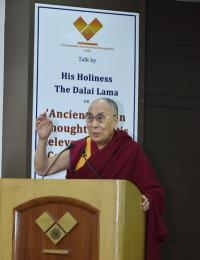On 08 February 2017, the Vivekananda International Foundation (VIF), for a second time since its inception in December 2009, had the honour and privilege of hosting the Nobel Peace Laureate, His Holiness the XIVth Dalai Lama, Tenzin Gyatso, the spiritual and temporal leader of the Tibetan people. While during his earlier visit in March 2010 His Holiness had enthralled the audience with a fascinating lecture, covering a broad spectrum of issues, Among other matters - ecological degradation, India's civilisational heritage, Non-Violence as an instrument of state policy and problems faced by Tibetan people - he chose to speak on ‘Ancient Indian Thoughts and its Relevance to the Contemporary World’ on his second visit. The Dalai Lama addressed a packed auditorium which had a number of prominent Delhi-based personalities, including former bureaucrats, ex-military officials and diplomats, besides the media personnel, sitting in the audience.
 The exiled spiritual head of the Tibetans, who has been living in India since 1959, recalled his association with Pt. Jawaharlal Nehru, Independent India’s first Prime Minister and the support extended to him by the latter in setting up centers of Buddhist studies across India. He stressed that ancient Indian learning’s not only continue to remain relevant in contemporary times but also attract modern scientists. He cited the example of quantum physics which has been explained in greater details in ancient Indian texts than what the modern science has been able to discover so far. Similarly, ancient Indian masters had greater understanding of human mind, compared to modern psychologists, the Dalai Lama stated.
The exiled spiritual head of the Tibetans, who has been living in India since 1959, recalled his association with Pt. Jawaharlal Nehru, Independent India’s first Prime Minister and the support extended to him by the latter in setting up centers of Buddhist studies across India. He stressed that ancient Indian learning’s not only continue to remain relevant in contemporary times but also attract modern scientists. He cited the example of quantum physics which has been explained in greater details in ancient Indian texts than what the modern science has been able to discover so far. Similarly, ancient Indian masters had greater understanding of human mind, compared to modern psychologists, the Dalai Lama stated.
His Holiness the Dalai Lama, who has been at the forefront of espousing great Nalanda tradition of learning and exporting it to other parts of Asia, however, pointed out that a scientific and system-based approach to studying Buddhism was evolved in Tibet as early as the eighth century with the arrival of an Indian master, Shantarakshita. The tradition, per se, travels further back in history several centuries before it arrived in Tibet from the pure lineage of the tradition of Nalanda Monastery in India. He explained the Nalanda tradition lays emphasis on memorizing the root text, then studying it word by word and then debating it with fellow students to penetrate the depths of its meaning.
Among other highlights of his talk, the Dalai Lama expressed his views on the present education system, secularism as it is being practiced in some countries, growing level of violence in societies across the world etc. His Holiness underlined that whereas in the ancient Indian education system, both mind and heart sailed together in perfect synergy, the modern education system, in large parts, remains devoid of moral values and compassion, which is why we are facing so many problems today. His holiness underscored that humanism and compassion, both essential ingredients of ancient education system, can play a great part in so far as healing the mind and purifying the soul are concerned.
True to his style and expectations of many in the audience, His Holiness the Dalai Lama kept the hall spellbound throughout with a mesmerizing talk, peppered with liberal doses of humour and sporadic bursts of sarcasm. A lively interactive session followed the talk.








